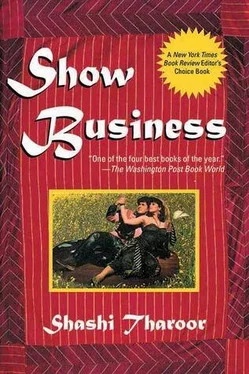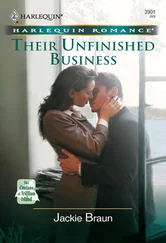I wondered whether, in the face of his outrage, it would be safe to say that I didn’t think this was a lot of money. He cut me off as if he had read my mind. “What-all are these people wanting, then, hanh? They are all unqualified for anything else. Uneducated people. Where else in India will any of them be earning so much?”
He had a point, and I backed away. That was many movies ago; but it occurs to me, as I eye The Boy’s rowdies near the red Fiat, that despite these terms there is never any shortage of Junior Artistes. They are produced on demand by “suppliers,” like any other commonly available commodity.
“Who’s in the straw hat?” I ask the director conversationally while the sign is being switched.
“Your heroine,” The Boy responds, as if astonished by the question.
“I gathered that,” I reply cuttingly. “But who is my heroine in this picture?”
The director looks mortally offended. “Mehnaz Elahi,” he tells me.
“Never heard of her,” I admit cheerfully. “Have I met her?”
I am not just being crass. There is a flood of new actresses washing up at the feet of producers these days. With the problems they are having getting dates for the handful of recognized big-name females who can still draw crowds at the box office (as poor Abha, falsies notwithstanding, no longer can), one way out for many producers is to cast an established hero against an up-and-coming heroine. I don’t mind too much because this new crop of heroines is good-looking, articulate, and largely uninhibited. The periods of enforced idleness at every shooting pass very pleasantly indeed in their company.
“I think she was at the muhurat” the director says, “but I remember you made only a fleeting appearance.”
“Ah, yes, that’s possible.” I am slightly embarrassed. The muhurat of any film, the auspicious moment when the opening shot is canned, is not an event its star is supposed to miss. But Subramanyam had, bless him, “given dates.” Not that I minded too much. Muhurats are packed with oversize individuals in undersize clothes, their eyes and thighs gleaming with a synthetic sheen. When they are not emitting raucous cries of recognition (while looking, in the midst of each embrace, for the next famous face to recognize) their tendency is to drape refulgent garlands on every available tripod, clapper board, or neck. I’m happy to avoid them. In any case, marigolds make me sneeze.
“OK, the signs up,” says The Boy. “Let’s go.” The cameraman takes up position. So do the rowdies. A sound man crouches behind the car, holding a mike on a fishing rod.
“Start sound! Camera! Action!”
The rowdies start their harassment. The girl in the straw hat looks helpless. I march in, upbraid them. They are not much impressed by my invocation of their mothers and sisters. They are more impressed by my fists. This is not a choreographed stunt scene, merely an impromptu thrashing. One or two of my blows almost make contact, but I manage to stop them just short, knowing from prior carelessness how painful sore hands can be. They turn tail and flee. I turn to the damsel I have rescued from distress.
“That takes care of them,” I begin. And then I dry up completely.
For the car door opens, just as it is supposed to, and out steps the most beautiful woman I have ever seen. She takes off her straw hat, and I am at a complete loss for words.
“Cut!” says the director. He strides into the frame. “What happened?” he demands. “You’re supposed to say, can I help …” He stops, because it is apparent I am not listening to him. Nor is the girl. She is looking directly at the expression on my face, and an intuitive smile is playing at the corners of her mouth.
“Oh,” says The Boy, taking this in. “Ashok Banjara, meet Mehnaz Elahi.”
“Hello,” she says. Her voice reaches deep inside me and strums a responsive chord. An echo emerges: “Hello,” I say.
“Well, now that we’ve got that out of the way,” says the director impatiently, “can we try that shot again? Only this time, you’re supposed to say …”
I get through that shift in a trancelike state. At the first opportunity, when Mehnaz has disappeared for a costume change, I ring Subramanyam.
“Change my dates a bit this month,” I instruct him. “I want to give priority to this young director’s film. Give him whatever shifts he wants.”
“I am doing, sir,” Subramanyam confirms disapprovingly, “but many producers not being happy with you. I just warning you, sir.”
“Good man. Now give The Boy all the dates he wants, OK? And one more thing — find out all you can for me about Mehnaz Elahi.”
Why did I marry Maya? This is probably a hell of a time to ask myself that question, with her expecting our first child in eight months. But as I sit next to her in our living room, answering intimate queries posed by a gushingly sympathetic reporter from Woman’s World (“Filmdom’s Dream Marriage”), I find myself asking it all the time. I look at her, hear myself talking about her to the public, gauge the disarming impression of mutual love and affection we are projecting so effortlessly, and wonder what it would be like to interview myself. Off the record, of course.
What did you see in her? A lovely face, a pretty smile, a gentle vulnerability that made me want to reach out and hold her, protect her against the world. Simplicity, too, of a kind I’d never come across in Delhi. A simple girl, good-natured and kind, with simple tastes, modest, unassuming, soft-spoken. A girl everyone loved.
Everyone loved her, so you thought you did, too? Well, that wouldn’t be fair. Everyone loved her, so I began to take more notice of her. And when she returned my attention, I felt terribly flattered that the girl everybody admired, admired me.
And love? Where did that come in? The first time I held her in my arms. It was actually on camera, a scene from Ganwaari. She looked up at me, and there was a kind of light in her eyes. I felt all sorts of emotions run through me that I couldn’t explain or define. I decided it must be love.
And her? Oh, she loved me. There was no doubt about that.
Did you want to take her to bed? Yes — and, oddly enough, no. I wanted to take her to bed, once. Very badly. I wanted to be the first man in her life, that way. Introduce her to that world, seal my possession of her. Sort of exercise the rights of a husband. But once I had that, once I was a husband, the need cooled very rapidly. She’s not a very sexy type, really. Small, and thin, and let’s face it, not much of a figure. Looks great in a sari, less great in a salwar-kameez, awful without either. I can’t say I married her to improve my sex life.
So were you the first man in her life? Funnily enough, I don’t know. I guess so, I mean it’s almost inconceivable that Maya … But there was someone she was close to before me, a minor actor, an inconsequential villain type. I can’t imagine that she’d have gone to bed with him, but then I can’t imagine he’d have not gone to bed with her. The devil of it is, I can’t ask her. I can just see her lip trembling and her eyes watering at the very thought of my doubting her. But …
And how’s it been? Your sex life? With Maya, not terribly good. It didn’t take me long to realize I’d married someone who reminded me of my mother. After that it was difficult to summon up much desire for her. I mean, I admire the girl, but how can you feel passion for someone you put on a pedestal? I think we’re both relieved she’s pregnant now. Production launched, rehearsals can be suspended.
And apart from Maya? What kind of question is that? I’m a married man.
Читать дальше












